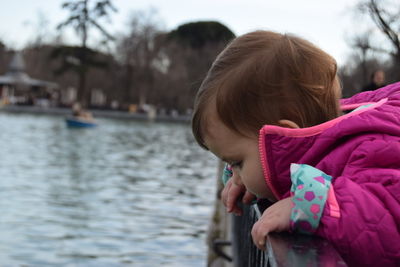Our authoritarian democracies going after the puppeteers
Our democracies have little left even of the mere appearance of what they proclaim to be. A recent "incident" in Spain provides a neat illustration of the totalitarian regimes that now rule us. Two puppeteers performing for the Carnival in Madrid were detained by the police and jailed without bail for apology of terrorism [2].
As the substance of their crime, one puppet mimicked the hanging of a judge.
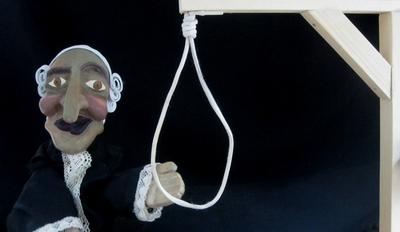
This image is, apparently, extremely violent and subversive, and requires our society of free speech, of tolerance, of perspectives and introspection to send its authors to jail. It turns out, incidentally, that their show was actually making a critics of society and those who rule it and was, by no account, making any apology of terrorism even by the most remote understanding of the term. Connoisseurs and amateurs of the group even link this particular play to a piece from Garcia Lorca [3]. But this is not even the point. Here is, while we're at it, a shot of the so-called terrorists:
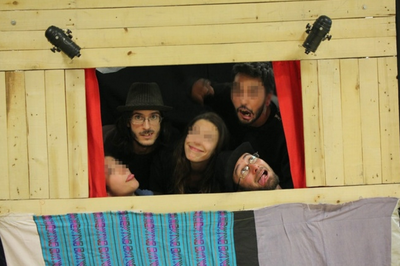
Another highlight of their outrage, that was heavily weighted against them when facing such serious charges, is the display by a puppet of a panel in Basque language reading Gora Alka-ETA. This indeed acclaims in a language that most cannot understand, a fictitious entity that combines ETA (Euskadi Ta Askatasuna, the Basque separatist group), and Al-Qaeda, the trendier Eurasia organization before Daesh took over. It is ironic, as in all great injustices, that the panel was flashed in a scene precisely to denounce a police cover-up and fabrication of false charges.
What saddens me even more than this brutal, stupid and ludicrous show of police and justice hand in hand in their corrupt abuse of power (in pretty much the lines criticized by the play itself), is the complacency of the public. Not only they did not oppose the police, they summoned it and they supported it.
How can one accept that on the pavement, the Guignol, the street-artist begging for money, the comic celebrating carnival, be arrested by the police! Is it not enough, if shocked, or bothered, or even not amused, to move along? These people whom we can here claim "esto es horroroso" [4], don't they swiftly move along when passing by some beggar rotting in a dirty corner, without taking time to express a disgust that should be at least equally strong? Why would one then stay at a stand with puppets pulled from below (that's the name of the group) finish to absorb you in their buffoonery? At which point are the puppets let fall on the floor and the armed force seizing the underneath artists be part of the real world again instead of its caricature? Wasn't this public also on the stage? What a great show indeed for the children to see the fiction become reality! How could the artists' view of the world be condemned when it unravels itself in real time before they draw the curtains? These puppeteers have written a page of their Art!
This, below, is the archetypal apology of terrorism by today's standard: seeing the real puppets, those pulling their own strings from above, showing the dance of the corrupt powers that oppress the people, that ridicule the people, humiliate the people, debase the people, torture the people and ultimately destroy the people. Because still, you see, the people must respect them and fear them. Not look at them, not see them, not understand them for what they are.
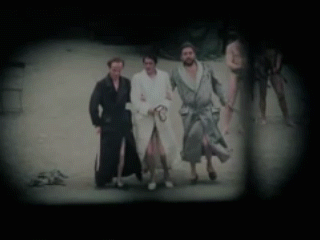
We must not bother them in their unashamed and vile dance that they trample our face with, we must not comment what they are and mock how they act in their fascist parody of justice and freedom, in their despotic conduct of societies within and extra borders, in their criminal rampages of arbitrary detention and never ending wars... We must still see them as respectable, sacred, as beyond a doubt of their righteousness, which is why, God forbid, never mention the gallows!
Am I, by the way, being apologetic of terrorism by expressing my shock at such ludicrous accusations of a couple of street artists in a remote corner of a dusty street of Madrid? You would think they wouldn't care of such an insignificant opinion from an even more desolated corner of the web. But who would think they would care about the puppeteers in the first place?
And daily news bring so many such exaggerated infringement of elementary liberties. Let me conclude this heart sickening story with another incident, a personal one, though of a much lesser magnitude, but that I also found terribly ironic.
A couple of weeks ago we were visiting the Palacio de Velázquez in the Retiro, which is a free annex of Reina Sofía museum, before going to show the big fishes of the pond to Julia, who likes all animals regardless of their method of locomotion. The exposition was from Andrzej Wróblewski, a Polish artist with a couple of original inputs (such as painting both sides of the canvas). He got very much impressed by fascist brutality during the war and after that, what his Œuvre strongly reflects in deathly blue tones. It was quite a sensation to leave the quiet and relaxing atmosphere of the park to enter this cold shouting outcry at the barbaric rule of law and order against the people. Wróblewski paints a lot the people, young and old, colorful and morbid side by side, many women, with lots of children, couples, a fantastic collection of ink drawing... His ghosts all bear some trouble expression on their face.
At some point, then, a cow-boy looking private-security personal diligently approached Elena and the baby, to tell them (what I figure out later, I was seeing the scene at a distance) to be careful with a bottle of water (sealed) they had with them. It's not clear what he meant because there was no danger whatsoever of anything happening (unless we had intentions to pro-actively damage the works, in which case the warning was useless anyway).
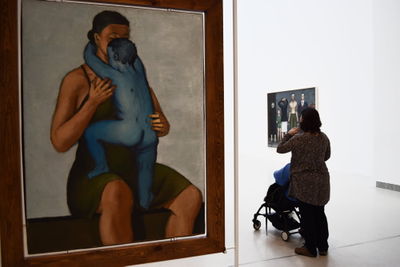
As I witnessed the exchange I approached my family whom I had left as I like to wander away in museum, and asked this person if the display of a firearm and a full collection of bullets on his belt was at all necessary. He answered that yes, it was necessary. I asked him what for, and to my surprise, he said it was to defend the precious pieces of art. I thus asked if he would be shooting at people if someone was touching the work and he replied evasively that he would make his duty to ensure that the work would remain safe. I then complained that I did not feel we people were safe in such a context and complained that armed people would have to come in contact with the general public, what more, for random statements about a bottle of water (that is allowed in the premise anyway). He said I could complain formally if I so felt like, which I said was a good idea and proceeded to make a formal complain.
I was surprised to see that to the normal staff—the one unarmed and distributing documentation at the entry, also in charge of handling the so-called complains—this staff sympathized with the private security guard minding people's belongings, rather than with me, who was pointing out the irony of a man with a riffle claiming to defend with bullets the work of a painter painting shot children. People want gunmen strolling around.
On the description of my complain, that I was reading aloud as I was penning it, I stated that the "agent" (he insisted I write "vigente" not "agente" to which I replied this was not my concern to know what exactly he was) was showing off his weapon, which made him stick his hip almost in my nose with the assertion that he didn't get it out, and was thus not showing it off. Showing it off even more in the process.
I was finally told, upon completing the useless piece of paper, that poor of me, if I don't like it here, then I should go to any other public place, like Atocha (this is a train station) and see what they have there in terms of security and then complain about this trifle of a riffle. Baffled by this foolproof logic—it's worst elsewhere and/or it has always been like that—it was only left for me to carry on the visit, although I was not anymore in the mood to see oppressed people in paintings, even if reversed by Wróblewski (he likes to draw them upside-down), when we were, like the Don Cristobal of Títeres desde Abajo, part of the scenery anyway.
So we left this useless culture from which we cannot feel estranged anyway, for the fishes, which was much more inspiring. Until one day, someone gets fun having their private security mind what private discussions people have with fishes.
